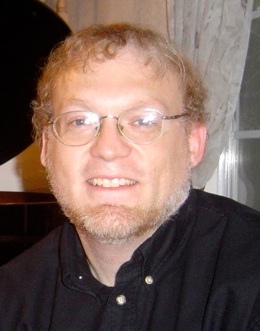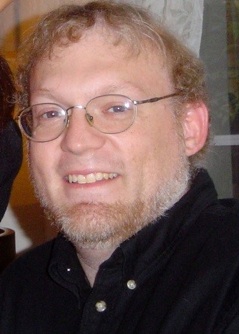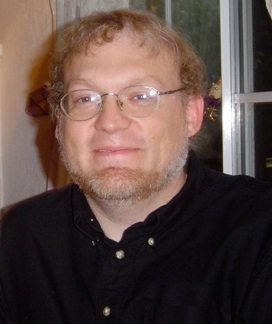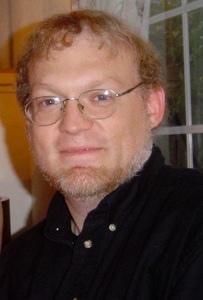David Nevue (pronounced NEV-yoo) is something of a Renaissance Man. He is a composer and a performing pianist, runs several music-related websites, is doing an internet radio broadcast, is setting up group piano concerts, etc. He wears many hats and does all of these things exceptionally well. David and I have had an email correspondence for several years, so it was really fun to have a long phone conversation to learn more about him and where some of these ideas have come from. We’re talking about doing a workshop in the near-future, so this will serve as an introduction to this very interesting man.
David Nevue was born in North Bend, Oregon in 1965. An only child, David’s father worked in a lumber mill when he was growing up, but had glue poisoning when David was twelve, and had to go on disability. At that point, David’s family moved to Colorado so his father could attend Seminary. He became a preacher and an evangelist. They lived in Colorado for five years, and David returned to Oregon for college. His mom was a cook for many years and is now retired; his dad passed away last fall.
David started piano lessons at 12, and went through three different teachers in three years. After the third year, he quit altogether. He played trumpet for three years in junior high, and also plays bass guitar and acoustic guitar. He plays guitar and piano for the worship band at his church. David cites Rush, U2, Kate Bush, Jethro Tull, Pink Floyd, and Renaissance as the artists who influence his musical style the most, and his favorite classical composers are Chopin, Debussy, Lizst, Ravel, and Rachmaninoff.
Outside of music, David enjoys going out to eat (“a bit too much, perhaps!”), car races, bowling, football, and finding time to go off and be by himself in the forest - “I love a good waterfall!” He is married and has two young children, and the family resides outside Eugene, Oregon.
KP: Where did you go to college, and what was your major?
DN: I went to George Fox College in Newberg, Oregon from 1983-87, starting out as a music major. Disappointed with the music department, I dropped the music major after my first semester, and was undeclared for about a year and a half. I was also heavily involved in theater and music theater, but a theater and drama major wasn’t available. My theater credits went to a Communication Arts major, with a minor in Music Theater. I was also one credit away from a minor in Writing Literature; I was writing a lot of poetry at that time.
KP: So you’ve always been very diversified.
DN: Yeah, at that time I really wanted to be a writer. I also wanted to be involved in theater, and after I got out of college, I interned with a local little theater group. That died when the founding couple divorced, and I never really pursued theater after that. My focus was starting to change. I gradually left the creative writer behind and began to delve more into music composition. I had a rock band phase, and after all the dust settled, I ended up being a solo piano artist. The only poetic prose I write now is the liner notes for my CDs.
KP: It seems like the majority of pianists in the new age/contemporary instrumental genre compare themselves to George Winston and name him as an influence, but with you, that seems to be especially true.
DN: My college roommate used to play Winston’s music all the time. I had never heard anything like it, and was really fascinated by it. When I first started to compose for the piano, I remember thinking about his riffs and seeing if I could find that sound, trying to get that vibe. I can’t imagine being a solo piano player had I not heard his music. It was one of those things where you’re exposed to something new, and the light goes on. I definitely consider Winston to be a major influence early on. I found my own sound with my second album, and then I kept exploring that.
KP: You wrote your first piano piece at about 20?
DN: In my junior year of college, I was asked to compose a soundtrack for a theater presentation of C.S. Lewis’ “Screwtape Letters” we were working on. I composed the music for that on keyboard, but later on, I recorded a couple of those pieces as piano solos.
KP: I remember your announcement two years ago that you were quitting your day job to become a full-time composer/musician. What was your day job back then?
DN: I worked at Symantec Corporation, which makes antivirus and security software, such as Norton Utilities. I worked there for eight years, and spent my first year in telephone support. I hated that! Then I did online support for three years, and really enjoyed that. Later on, I moved into quality assurance, and managed that department for the e-commerce part of the company.
KP: So that’s where you really got immersed in the internet.
DN: Oh yeah, totally!
I started promoting my music on the internet in ‘95, but I just had a webpage that I put together for marketing and selling my second album. I didn’t really know what I was doing, and I don’t think anyone else did at the time, either. At the beginning, most people looked at the internet as a kind of video game, and I don’t think anyone really expected it to become the culture it’s become. I got on there early, and then I wrote my book the end of ‘97 on how to promote your music on the internet. I’ve been updating that every few months, so that’s a big part of my life and my income. I also I have the Music Biz Academy (
musicbizacademy.com), which is my educational website for musicians. And then I have my CDs and sheet music, so I have a lot of different aspects to my online business as well as the various partnerships that I’ve formed. As my business grew, it got to the point where I was making as much money on the internet as I was at Symantec. I worked both for a year to be sure that it wasn’t a fluke, and saved enough money to live on for a year if suddenly everything died. I left Symantec in November 2001, and I’ve been doing this full time ever since.
KP: Is your book in a hard copy or is it something that is downloaded?
DN: It’s in both hard copy and pdf format.
KP: You really do it all!
DN: That’s just part of who I am - I’m very much an idea person. It’s really cool because the performance part of my career is really taking off now. Two years ago, gigs were rare, but now I’m playing pretty regularly. The first Whisperings Radio group concert will be on April 3 and 4 with five or six other composers. We’re doing it in Steinway Recital Hall in Seattle, which only seats 65, so we’re doing two concerts. I don’t think we’ll have any trouble selling that out. After the Seattle show, I’d like to do a bigger piano event in Portland, Oregon, and also one in San Francisco because there are several Whisperings Solo Piano Radio artists in that area. I really think that when people experience these concerts, they’ll want to go again. Once we get this process rolling, we can do events in many different areas of the country on a yearly basis. This project takes the involvement of many different people. That’s one of the reasons I put the Whisperings project together - by myself, there is only so much I can do, but by pooling ALL of our resources together, the possibilities are amazing. The Whisperings Solo Piano Radio broadcast is going gangbusters. It’s filling up everyday now, and listeners can’t always get in because we’ve maxed out our bandwidth. About 30,000 people are listening to it each month.
KP: Can you expand the bandwidth or start a second broadcast?
DN: I plan to expand the bandwidth, but first I have to get a few technical things in place like links that will take people to artists’ websites. Once I have that completed, I’ll ask the artists to contribute a modest amount per month, and then I’ll give them something back in terms of promotional benefit. Right now, I’m paying for all of this out of my pocket. I’m really hoping to make this a community thing, and I feel like I want to get other people involved before I invest more money. I look at it as a long-term investment in terms of exposure and in building relationships with all of these artists. In the future, the ability of all of us to be out there playing and getting our music in front of new people is a tremendous opportunity.
KP: When did “Whisperings, Solo Piano Radio” start up?
DN: The first official broadcast was August 1, 2003. I intend to take the broadcast to other places, too, but I’m not sure how that’s going to happen. I’m very confident in our ability to continue to grow and seriously create a brand of solo piano music.
KP: How does the internet radio work? I have no clue about how the music gets onto the internet.
DN: It’s really very easy. I pick songs from CDs that are appropriate for the broadcast. I listen to submitted albums 15-20 times to see which songs really stand out to me. Next, I take the songs that I’ve chosen and save them to MP3 Pro format. Then I upload them to the broadcast on Live 365. I can tell the program to play the music randomly or in order. Aside from some technical adjustments, that’s all there is to it.
The biggest part of the job is listening to the music and deciding what to use, and then contacting the artists and getting them onboard. Because of legal issues, I’m required to have them sign a license agreement, and they have to give me direct permission to play the music royalty-free. The music must be original, and no one else can own any part of the song. All this legal stuff was kind of a nightmare in itself. The thing I hate about dealing with licenses or contracts is that they make things impersonal, but, unfortunately, it’s necessary. I have to protect myself, both from piracy and from anybody saying that I’m using the music without permission. I’m really trying to create a community, and I want artists who really believe in the concept. Our list is growing every day. Some of the better-known artists are David Lanz, Suzanne Ciani, and Robin Spielberg, and it's a thrill to have them participate. Hopefully the radio exposure will help the others become well-known, too.
KP: Did you travel with your dad when he ministered in other countries?
DN: No, I didn’t. My dad was a street preacher. He would go to downtown Portland, with kind of a tent-trailer on the back of his rig that opened into a platform. He’d stop at rest areas, and would pull out his Bible and preach. A pretty dynamic guy, my dad. He was the pastor for a couple of churches, but his gift was always more toward evangelism. There is a difference between teaching and preaching, and Dad was a preacher. A bishop from Kenya heard and saw him when he was traveling here, and invited Dad to come to Africa. He wanted Dad to be the president of a Bible college they were building in Nairobi, but that never came to fruition. I’m not sure why, but I think it was partly because Mom didn’t want to move to Africa. My dad was a very strong person with a strong personality. That served him well in using the gift that God gave him in terms of his preaching. He was in Africa for many months at a time - in Uganda, Kenya, and Ethiopia. He was a great man in that not everybody is built that way - he was able to be in front of strangers doing something that he knew was going to irritate some people. People responded either very negatively or very positively to my dad with everything. I think that Africa was where he had his most successful ministry. Here was a short white man who had such a power about him. He was 5’6”, but he was like a giant with his personality. My faith is the best thing my father ever gave me. We didn’t the best relationship, but I think I inherited my drive and go-get-it-ness as well as my ability to persevere from him. However, I’m a much more sensitive person than my father was, and that I got from my mom. It’s like I got the hard edge from my dad and it was softened by my mom.
KP: Since your faith plays such a big part in your life, how does that affect your approach to composing?
DN: I think it does a lot of things in my composing because I feel so strongly that I have been gifted - I know that sounds kind of arrogant, but I do not feel like I ever really had to work for the ability that I have with the piano. I’m not someone who spends five hours a day at their instrument - I never have been. I probably practice six or seven hours a week. When I started composing for piano, it always felt like it came naturally. I’m not saying that I haven’t worked at it - I have - but sometimes I look at what I’ve done and wonder where it came from. I feel strongly that it was a gift - it was something that God infused me with. Because of that, it feels so important to use that gift, to the best of my ability, to glorify Him, to express God’s love and mercy through my music. Where my dad was a preacher, I’m more of a teacher. The cool thing about the music is that, with a lot of people, when you start talking about Jesus and your faith, there is a wall that goes up, but when the music is involved and it’s an artistic thing, people accept that art is a legitimate way to express faith. At a house concert, I often share Bible passages that have influenced songs. I bring my faith into it, not to preach to people, but to explain where the music came from. People really respond well to that, and I feel that if I have the opportunity to use my music as a means to honor God, that’s the best thing I can do. In terms of my writing, my faith is always involved. A lot of my inner world is very wrapped up in prayer, and my music is often an expression of that prayer or an emotion that I’m feeling. My music is about the wonders of His creation and the wonders of the places I go. My music is the soundtrack of my life and my faith.
KP: You have said that most of your recorded music is very composed as opposed to improvised. Once they are finished, do you play your pieces pretty-much the same each time, or do they evolve?
DN: They might be a little bit different in terms of phrasing and pacing, or sometimes my mood will affect how I play or perform a piece. The nature of an event where I’m performing can also affect the playing of a piece, but the notes that I play very rarely change. When they change, I think to myself, “Oh man, I recorded the song before I was really finished with it.” With a few exceptions, once a piece is recorded, that’s pretty much how it is played.
KP: Do you record your albums in stages?
DN: Yes. I like to record the music when it’s still really fresh and I’m excited about it. I always try to record the songs while I’m still in love with them because you can really tell that on the recordings. I don’t want to lose that newness and creative energy. When I go into the recording studio, I usually have about eight pieces that are ready to record, and I generally come home with five that I’m very happy with. I’ll rework things, and then go back in and try to get it better. My first two albums were each recorded in one session. At that time in my life, I was just happy to get a recording without mistakes. The older I’ve gotten, the more of a perfectionist I’ve become. Now, not only do I want to get the song recorded, I’m trying to find that magic take that has that special, intangible quality that makes it more than just a performance.
KP: Do you have any words of advice for young people who are studying music now?
DN: In terms of playing the piano, do what you like to do. Go for whatever excites you musically. If classical music doesn’t excite you, what does? What do YOU want to learn to play? Get the CD, sit down at your piano, and see if you can pick out the song. Find the melody, figure out the chords and song structure, and be determined to learn it. Next, be willing to compromise. Once you’re working on songs that you actually WANT to learn, take some time out every day to work on your music theory, even if you dread doing it. In the end, the music theory that you learn will give you the understanding you need to better play the songs you really want to play. I never had a chance at becoming a serious piano player until I understood basic music theory. In fact, it was the point at which I began to understand that my musical ability really took off.
KP: Is there anything else you’d like to talk about?
DN: I’m just extremely thankful to be able to do what I’m doing. I cannot imagine my life without music. I think the music itself creates a real drive in me. It’s like each of the compositions and each moment at the piano is itself like one single note in the grand composition that is life. Music, for me, definitely has a purpose, especially as it relates to my faith and my belief that it came from God. It’s what God gave me to do, and I’m going to do it to the best of my ability. I’m not the perfect piano player, I’m not the perfect composer. I’m just fortunate that I write and play music that people enjoy. That was what made me realize that maybe I could do it as a profession. It’s a marvelous thing to be able to compose and do something you love, and have other people relate to it and really appreciate it.
Many thanks to David for sharing his life with us! For more information and samples of his music, visit
his website.
Kathy Parsons
February 2004




